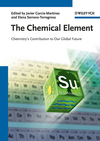When, in January 2011, the International Year of Chemistry (IYC) was officially launched at the UNESCO headquarters in Paris, France, there was a general consensus among all attendees that chemistry is instrumental in delivering the solutions for many of our current global challenges, among them economic sustainability, food production, water supply, global health, energy, and climate change.
These are very noble goals for the global chemistry community, but are they attainable? In their new book The Chemical Element – Chemistry’s Contribution to Our Global Future, Javier Garcia-Martinez and Elena Serrano-Torregrosa from the University of Alicante, Spain, have asked leading scientists for their view on how chemistry can address global challenges. Following the roadmap defined by the UN millennium development goals, the challenges in global development, hunger and food security, poverty, education, human health, sustainable production, water, energy, and climate are examined. For all of these, chemistry-driven solutions are evaluated, based on recent scientific, economic, and social data.
In their foreword to the book, Nicole Moreau, president of IUPAC, and Julia Hasler, UNESCO representative for the IYC, argue that chemistry is placed “at the centre of challenges and solutions for our planet”. If that holds true, then chemists are clearly needed to drive development in all regions of our planet. But are there enough of them? One alarming figure from the book shows that there is a severe lack of trained scientists in many parts of the world. A prime goal of the IYC, namely to encourage the interest of young people in chemistry, may well prove to be the crucial factor for delivering chemistry’s many promises.
.gif)
The quest for chemists must, and will continue, as Garcia-Martinez is ready to acknowledge. At the IUPAC World Chemistry Congress, he, together with Peter Mahaffy — the chair of the IUPAC Committee on Chemistry Education and one of the contributors to the book — is hosting a debate session that will challenge the panelists to think about new and more efficient uses of chemical technology and chemical knowledge for meeting the Millennium Development Goals.
So, will chemistry make the world a better place? A compelling answer is provided by Jeffrey Sachs, director of the Earth Institute and former director of the Director of the UN Millennium Project in his epilogue to the book: “Bringing top science to bear on public policy will be increasingly vital for our very survival. … Chemistry is key to human wellbeing. The appreciation of chemistry’ s contributions is vital to emerging the next generation of scientists, policy makers, and informed citizens.”

The Chemical Element – Chemistry’s Contribution to Our Global Future
J. Garcia-Martinez, E. Serrano-Torregrosa,
Wiley-VCH, Weinheim, 2011.
ISBN: 978-3-527-32880-2- Book review for UNESCO by Julia Hasler, International Scientific Development and Cooperation, UK
- More information at www.thechemicalelement.com
- More on Researchers Locations



